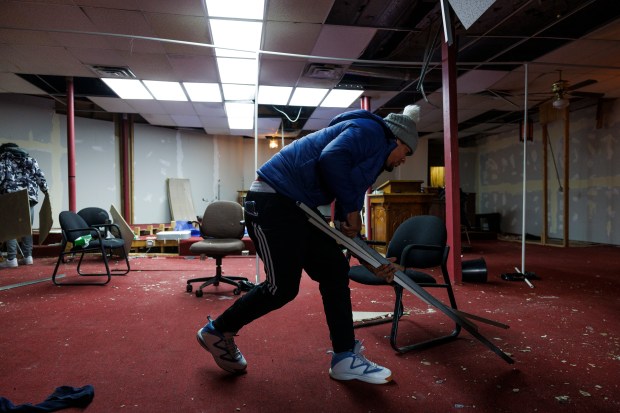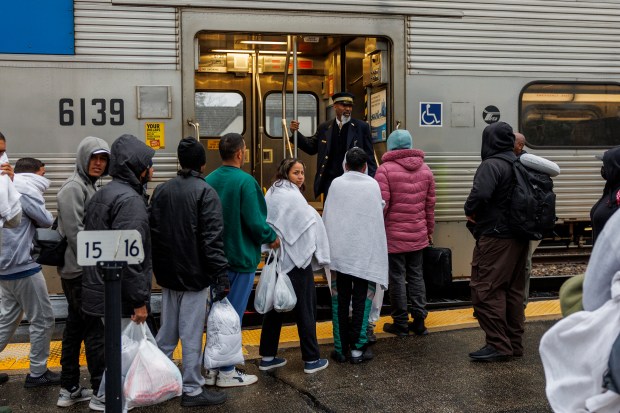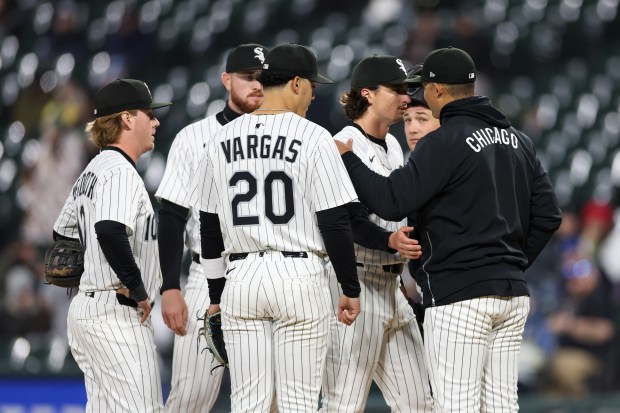When Ana Gil heard the news that the Supreme Court Monday allowed the Trump administration to strip legal protections for thousands of recent Venezuelan migrants, she cried. The move means 350,000 Venezuelans in the United States, including some of the estimated 50,000 who arrived in Chicago over the last several years, could be deported.
How or where? That is unknown, Gil said. She is co-founder of the Venezuelan Alliance in Chicago. Over the last decade, Gil has worked with other immigration advocates to provide resources and legal advice for migrants who have arrived here from Venezuela.
Most, she said, have fled political turmoil and extreme poverty. Temporary Protected Status, a humanitarian protection granted to nationals from countries facing extraordinary conditions such as war and disaster, provided room for families and individuals to start anew by providing them a work permit and protection from deportation.
For the Venezuelan community in Chicago, the news has turned hope into heartbreak.
Maria Belen arrived in Chicago from Venezuela under humanitarian parole in December 2022. Shortly after, she applied for TPS, which was essential for her and her family to establish themselves in the city. It is the sole protection she had from deportation.
“Now I have nothing,” Belen said Monday.
Belen said she and her family have made Chicago their home. She is an assistant teacher at a CPS school, thanks to her education degree from Venezuela. Her husband works for an IT company, and their daughter is finishing her general education before pursuing a career in engineering at Wilbur Wright College.
“But right now, we really don’t know anything. We don’t know what’s going to happen, where are we going to go or how,” Belen said. “When we came here we had a clear goal: work and do well for society. We paid our taxes, we were doing everything right as dictated by the law and we are still getting kicked out.”
At the center of the chaos, Gil said, is fear and uncertainty. Some migrants have requested information on how to migrate to another country while others are choosing to wait for advocates to act on their behalf and find a way to defend their status.
“I’m so sad. I still can’t believe we have reached this point,” Gil said. “But we will keep fighting against this. We’ve done it before”
The court’s order, with only one noted dissent, puts on hold a ruling from a federal judge in San Francisco that kept in place Temporary Protected Status for the Venezuelans that would have otherwise expired last month, The Associated Press reported. The justices provided no rationale, which is common in emergency appeals.
The complex economic and political crisis in Venezuela has driven more than 7.7 million people to leave the South American nation since 2013. Venezuela’s most recent economic troubles pushed year-over-year inflation in April to 172%. The latest chapter even prompted President Nicolás Maduro to declare an “economic emergency” last month. Maduro, whose reelection last year to a third term has been condemned internationally as illegitimate, also has cracked down on political opponents.
In the dispute over TPS, the administration has moved aggressively to withdraw various protections that have allowed immigrants to remain in the country, including ending the temporary status for a total of 600,000 Venezuelans and 500,000 Haitians. That status is granted in 18-month increments. Venezuela was first designated for TPS in 2021; Haiti, in 2010.
The new decision from the Supreme Court only impacts 2023 designation of TPS for Venezuelans. Haiti’s determination is still under review but not impacted by this specific decision. Any Venezuelan who was granted status under the 2021 designation is not affected and continues to have status until Sept. 10.
The justices left open the possibility that individual Venezuelan citizens could bring their own challenges against efforts by Kristi Noem, secretary of Homeland Security, to terminate their work permits or to remove them from the United States, according to SCOUTUSblog.
Justice Ketanji Brown Jackson indicated that she would have denied the government’s request and left the lower court’s ruling in place while litigation continues.
That’s what gives Gil hope. She said that it is too early to have a strategy on how to move forward, but said that the Venezuelan Alliance in Chicago is working hand in hand with the National TPS Alliance and other local organizations.
“It is extremely expensive to find a way to stay in the country legally individually, but as a group, we can do more,” Gil said.
The Supreme Court’s decision does not end the litigation, which will continue in the court of appeals, said Helena Olea, deputy director of Alianza Americas. The Chicago-based organization works to provide resources to asylum-seeking migrants and other immigrants.
“However, by lifting the stay on the termination of TPS for Venezuela, the final ruling — which could side with the plaintiffs — will arrive too late. Without TPS, many Venezuelans could be deported, could decide to travel to other countries or could be arbitrarily labeled as members of the Tren de Aragua or as enemy combatants and sent to El Salvador. All of these are devastating alternatives that put deserving individuals at imminent risk of human rights violations,” Olea said.
As legal advocates push for federal intervention, community leaders are calling on local residents to stand in solidarity.
“Today the Supreme Court allowed Trump and the Department of Homeland Security to once again sow panic and confusion among our communities,” said Dulce Ortiz, executive director of Mano a Mano Family Resource Center, board president of the Illinois Coalition for Immigrant and Refugee Rights (ICIRR).
“Over the last three years, many ICIRR member organizations across the state worked to welcome new arrivals, many of whom are from Venezuela and seeking safety and opportunity in a new home. Some arrived on their own, and others as part of a political stunt that attempted to use immigrants as a weapon against welcoming communities. Regardless of how they arrived in Illinois, all people deserve to be treated with dignity and respect,” Ortiz said.
In the Chicago area, roughly 9,000 Venezuelan migrants are estimated to have TPS, according to the Venezuelan Alliance and the The Resurrection Project, which have held legal clinics to provide free counsel for migrants.
Chicago has helped thousands of Venezuelan migrants to settle in the city after a tumultuous start when Texas Gov. Greg Abbott sent busloads of migrants to Chicago over the past couple of years.

Many Venezuelans have filled key roles in industries facing labor shortages — including health care, construction and caregiving. With TPS ending, employers and communities alike worry about the impact.
“Venezuelan migrants have become an integral part of our communities. They are our neighbors, co-workers, caregivers, and should be recognized for their societal contributions,” said Olea. “It must not be forgotten, there is ongoing political repression, economic collapse, widespread human rights violations, and a humanitarian crisis — marked by food and medicine shortages — that make Venezuela unsafe for return, warranting continued TPS protection,” Olea said.
The Resurrection Project and other immigrant legal clinics say they are being flooded with calls from panicked families.
“Today’s decision will harm hundreds of thousands of immigrants, their families and their communities,” said Erendira Rendón, vice president of immigrant justice at The Resurrection Project. “TRP remains committed to working toward a future where all people in the U.S. are afforded an opportunity to achieve the American Dream.”
TRP will continue to provide legal guidance to those who have TPS by appointment through their legal clinic.
State Rep. Barbara Hernandez, head of the state’s House Immigration Committee and a Democrat who represents portions of Aurora, North Aurora and Batavia, told the Tribune Monday the decision is “terrible” and “disappointing.”
Many of these Venezuelan families, she said, were approved to stay in the country because going back to Venezuela meant returning to a dangerous situation. That federal approval allowed them to work and start a life for the past several years.
“I think it leaves families uncertain about their future in this country,” said Hernandez. “These are people who were being retaliated against in their home country, so they can’t go back to their home country. So now we are leaving families to go through the trauma again, potentially going back.”
The decision, she said, also makes it more difficult for the state to fight federal immigration policies, but in the meantime, “we need to just protect the people we have right now.”
Despite the uncertainty Belen said she remains hopeful.
“Everything happens very fast. We thought we would lose TPS in April. We didn’t. Now we’re back to this, but we don’t know what can happen next,” Belen said.
Though the uncertainty sometimes feels debilitating, she said that she and her family are committed to staying together.
If she must leave the United States, she will be devastated. Returning to Venezuela is not an option because “there’s nothing there for us.”
“Maybe a different country,” she said.
The Associated Press and Chicago Tribune’s Addison Wright contributed.





